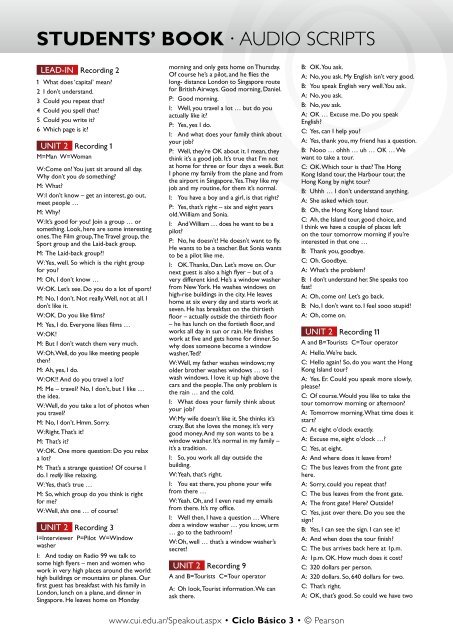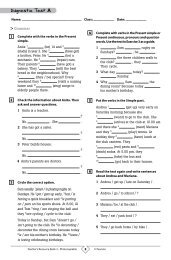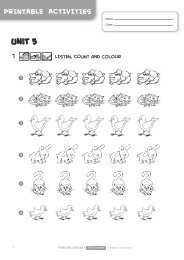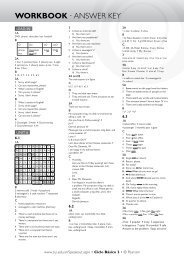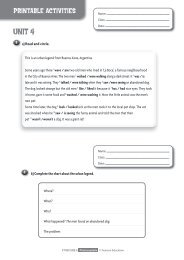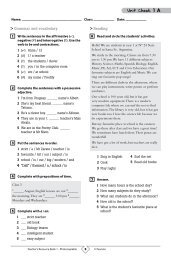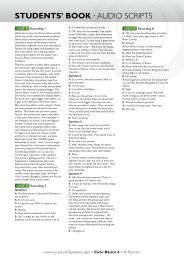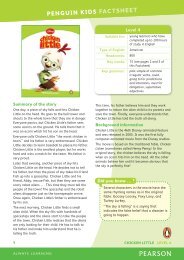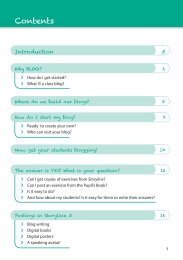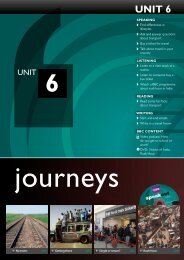STUDENTS' BOOK · AUDIO SCRIPTS - Pearson ELT
STUDENTS' BOOK · AUDIO SCRIPTS - Pearson ELT
STUDENTS' BOOK · AUDIO SCRIPTS - Pearson ELT
Create successful ePaper yourself
Turn your PDF publications into a flip-book with our unique Google optimized e-Paper software.
STUDENTS’ <strong>BOOK</strong> · <strong>AUDIO</strong> <strong>SCRIPTS</strong><br />
Lead-in Recording 2<br />
1 What does ‘capital’ mean?<br />
2 I don’t understand.<br />
3 Could you repeat that?<br />
4 Could you spell that?<br />
5 Could you write it?<br />
6 Which page is it?<br />
Unit 2 Recording 1<br />
M=Man W=Woman<br />
W: Come on! You just sit around all day.<br />
Why don’t you do something?<br />
M: What?<br />
W: I don’t know – get an interest, go out,<br />
meet people …<br />
M: Why?<br />
W: It’s good for you! Join a group … or<br />
something. Look, here are some interesting<br />
ones. The Film group, The Travel group, the<br />
Sport group and the Laid-back group.<br />
M: The Laid-back group?!<br />
W: Yes, well. So which is the right group<br />
for you?<br />
M: Oh, I don’t know …<br />
W: OK. Let’s see. Do you do a lot of sport?<br />
M: No, I don’t. Not really. Well, not at all. I<br />
don’t like it.<br />
W: OK. Do you like films?<br />
M: Yes, I do. Everyone likes films …<br />
W: OK!<br />
M: But I don’t watch them very much.<br />
W: Oh. Well, do you like meeting people<br />
then?<br />
M: Ah, yes, I do.<br />
W: OK!! And do you travel a lot?<br />
M: Me – travel? No, I don’t, but I like …<br />
the idea.<br />
W: Well, do you take a lot of photos when<br />
you travel?<br />
M: No, I don’t. Hmm. Sorry.<br />
W: Right. That’s it!<br />
M: That’s it?<br />
W: OK. One more question: Do you relax<br />
a lot?<br />
M: That’s a strange question! Of course I<br />
do. I really like relaxing.<br />
W: Yes, that’s true …<br />
M: So, which group do you think is right<br />
for me?<br />
W: Well, this one … of course!<br />
Unit 2 Recording 3<br />
I=Interviewer P=Pilot W=Window<br />
washer<br />
I: And today on Radio 99 we talk to<br />
some high flyers – men and women who<br />
work in very high places around the world:<br />
high buildings or mountains or planes. Our<br />
first guest has breakfast with his family in<br />
London, lunch on a plane, and dinner in<br />
Singapore. He leaves home on Monday<br />
morning and only gets home on Thursday.<br />
Of course he’s a pilot, and he flies the<br />
long- distance London to Singapore route<br />
for British Airways. Good morning, Daniel.<br />
P: Good morning.<br />
I: Well, you travel a lot … but do you<br />
actually like it?<br />
P: Yes, yes I do.<br />
I: And what does your family think about<br />
your job?<br />
P: Well, they’re OK about it. I mean, they<br />
think it’s a good job. It’s true that I’m not<br />
at home for three or four days a week. But<br />
I phone my family from the plane and from<br />
the airport in Singapore. Yes. They like my<br />
job and my routine, for them it’s normal.<br />
I: You have a boy and a girl, is that right?<br />
P: Yes, that’s right – six and eight years<br />
old. William and Sonia.<br />
I: And William … does he want to be a<br />
pilot?<br />
P: No, he doesn’t! He doesn’t want to fly.<br />
He wants to be a teacher. But Sonia wants<br />
to be a pilot like me.<br />
I: OK. Thanks, Dan. Let’s move on. Our<br />
next guest is also a high flyer – but of a<br />
very different kind. He’s a window washer<br />
from New York. He washes windows on<br />
high-rise buildings in the city. He leaves<br />
home at six every day and starts work at<br />
seven. He has breakfast on the thirtieth<br />
floor – actually outside the thirtieth floor<br />
– he has lunch on the fortieth floor, and<br />
works all day in sun or rain. He finishes<br />
work at five and gets home for dinner. So<br />
why does someone become a window<br />
washer, Ted?<br />
W: Well, my father washes windows; my<br />
older brother washes windows … so I<br />
wash windows. I love it up high above the<br />
cars and the people. The only problem is<br />
the rain … and the cold.<br />
I: What does your family think about<br />
your job?<br />
W: My wife doesn’t like it. She thinks it’s<br />
crazy. But she loves the money, it’s very<br />
good money. And my son wants to be a<br />
window washer. It’s normal in my family –<br />
it’s a tradition.<br />
I: So, you work all day outside the<br />
building.<br />
W: Yeah, that’s right.<br />
I: You eat there, you phone your wife<br />
from there …<br />
W: Yeah. Oh, and I even read my emails<br />
from there. It’s my office.<br />
I: Well then, I have a question … Where<br />
does a window washer … you know, urm<br />
… go to the bathroom?<br />
W: Oh, well … that’s a window washer’s<br />
secret!<br />
Unit 2 Recording 9<br />
A and B=Tourists C=Tour operator<br />
A: Oh look, Tourist information. We can<br />
ask there.<br />
B: OK. You ask.<br />
A: No, you ask. My English isn’t very good.<br />
B: You speak English very well. You ask.<br />
A: No, you ask.<br />
B: No, you ask.<br />
A: OK … Excuse me. Do you speak<br />
English?<br />
C: Yes, can I help you?<br />
A: Yes, thank you, my friend has a question.<br />
B: Nooo … ohhh … uh … OK … We<br />
want to take a tour.<br />
C: OK. Which tour is that? The Hong<br />
Kong Island tour, the Harbour tour, the<br />
Hong Kong by night tour?<br />
B: Uhhh … I don’t understand anything.<br />
A: She asked which tour.<br />
B: Oh, the Hong Kong Island tour.<br />
C: Ah, the Island tour, good choice, and<br />
I think we have a couple of places left<br />
on the tour tomorrow morning if you’re<br />
interested in that one …<br />
B: Thank you, goodbye.<br />
C: Oh. Goodbye.<br />
A: What’s the problem?<br />
B: I don’t understand her. She speaks too<br />
fast!<br />
A: Oh, come on! Let’s go back.<br />
B: No, I don’t want to. I feel sooo stupid!<br />
A: Oh, come on.<br />
Unit 2 Recording 11<br />
A and B=Tourists C=Tour operator<br />
A: Hello. We’re back.<br />
C: Hello again! So, do you want the Hong<br />
Kong Island tour?<br />
A: Yes. Er. Could you speak more slowly,<br />
please?<br />
C: Of course. Would you like to take the<br />
tour tomorrow morning or afternoon?<br />
A: Tomorrow morning. What time does it<br />
start?<br />
C: At eight o’clock exactly.<br />
A: Excuse me, eight o’clock …?<br />
C: Yes, at eight.<br />
A: And where does it leave from?<br />
C: The bus leaves from the front gate<br />
here.<br />
A: Sorry, could you repeat that?<br />
C: The bus leaves from the front gate.<br />
A: The front gate? Here? Outside?<br />
C: Yes, just over there. Do you see the<br />
sign?<br />
B: Yes, I can see the sign. I can see it!<br />
A: And when does the tour finish?<br />
C: The bus arrives back here at 1p.m.<br />
A: 1p.m. OK. How much does it cost?<br />
C: 320 dollars per person.<br />
A: 320 dollars. So, 640 dollars for two.<br />
C: That’s right.<br />
A: OK, that’s good. So could we have two<br />
www.cui.edu.ar/Speakout.aspx • Ciclo Básico 3 • © <strong>Pearson</strong>
STUDENTS’ <strong>BOOK</strong> · <strong>AUDIO</strong> <strong>SCRIPTS</strong><br />
tickets for tomorrow morning, please?<br />
B: Er, do you take credit cards?<br />
C: Yes, of course …<br />
Unit 2 Recording 14<br />
M=Man W=Woman<br />
M: Oh no! Look at this mess. Where’s the<br />
hoover?<br />
W: Urm … Oh, here it is. I am surprised,<br />
Mark. Do you like cleaning?<br />
M: Yes, I love it!<br />
W: Uh, really?! Why?<br />
M: Well, I study all week and by Friday my<br />
apartment looks terrible!<br />
W: Right …<br />
M: So on Saturdays I clean all morning. It<br />
makes me feel good. What about you? Do<br />
you like cleaning?<br />
W: No, I don’t! I hate it. I don’t like cleaning<br />
or washing.<br />
M: So … what do you like doing?<br />
W: At home, I like doing nothing! Well, I<br />
like playing video games and watching TV,<br />
you know … just relaxing.<br />
M: Me, too. But after the cleaning!<br />
Unit 3 Recording 1<br />
intelligent, kind, talkative, friendly, funny,<br />
stupid, unkind, quiet, unfriendly, serious<br />
Unit 3 Recording 2<br />
A: I don’t like talkative people, and my<br />
friend José is usually very quiet. People think<br />
he’s not very friendly because he’s quiet and<br />
often serious, but in fact he’s really friendly<br />
and he’s sometimes very funny – not all the<br />
time, but sometimes. We don’t like doing<br />
the same things, so we hardly ever do things<br />
together, maybe two or three times a year.<br />
For example, he likes computer games<br />
and staying at home and I go out a lot …<br />
but it’s not a problem. When we meet, he<br />
always asks me how I am, and he really<br />
listens to me. And when he phones me with<br />
a problem, I always listen to him. He’s a<br />
good friend and we usually understand each<br />
other well.<br />
B: My friend Rosa is usually very funny –<br />
she makes jokes and we laugh a lot. We<br />
like the same things, we’re always together.<br />
We often go out to clubs – two or three<br />
times a week – and to parties … She talks<br />
a lot, and she’s a friendly person, but are<br />
we really close friends? I don’t know … I<br />
think I’m a good friend to her, but she …<br />
when I have a problem, she hardly ever<br />
listens to me. So sometimes she’s not<br />
very kind. She’s an intelligent person, and<br />
I sometimes feel stupid around her. We<br />
don’t always understand each other, but<br />
you know, she’s a good friend … I think.<br />
Unit 3 Recording 5<br />
J=Jack R=Ron<br />
J: Hello?<br />
R: Hi, Jack. It’s Ron.<br />
J: Oh, hi. How are you?<br />
R: Fine, thanks. And you?<br />
J: OK.<br />
R: Uh, well, I’m at my new office, you know<br />
I’ve got a new job … Uh, the work’s quite<br />
interesting and the people are very friendly<br />
… Hello, are you there?<br />
J: Yes. Yes, I’m still here.<br />
R: … and the work isn’t too difficult …<br />
Hello, are you there?<br />
J: Yes.<br />
R: Oh … and, well, I haven’t got my own<br />
office and one of the people in my office is<br />
really unfriendly … Are you there?<br />
J: Yes, I’m here.<br />
R: Anyway, are you free tonight?<br />
J: Yeah, I think I am. What do you want to<br />
do?<br />
R: How about going to the cinema? I’d like<br />
to see the new Will Smith film.<br />
J: Will Smith … ah, wait, I’m busy. Sorry …<br />
R: Oh … OK, well, maybe next time.<br />
J: Yeah, see you.<br />
R: Bye.<br />
Unit 3 Recording 6<br />
D=Denise R=Ron<br />
D: Hello?<br />
R: Hi, Denise. It’s Ron.<br />
D: Oh, hi. How are you?<br />
R: Fine, thanks. And you?<br />
D: I’m OK. How’s your new job?<br />
R: Good. The work’s quite interesting and<br />
the people are quite friendly …<br />
D: Uh-huh.<br />
R: … and the work isn’t too difficult.<br />
D: That’s great.<br />
R: It’s not perfect. I haven’t got my own<br />
office and one of the people in my room is<br />
really unfriendly …<br />
D: Oh, that’s a shame!<br />
R: Yeah. Anyway, are you free tonight?<br />
D: Yeah, I think so. What do you want to<br />
do?<br />
R: How about going to the cinema? I’d like<br />
to see the new Will Smith film.<br />
D: Sounds good. Where’s it on?<br />
R: At the ABC in town.<br />
D: OK. What time do you want to go?<br />
R: It’s on at six o’clock and at half past<br />
eight. What’s good for you?<br />
D: I finish work at five. So six is good.<br />
R: Right. How about meeting at … er …<br />
half past five at the cinema?<br />
D: Yes, that’s fine.<br />
R: Great! See you there.<br />
D: Yeah. Oh, how about inviting Jack?<br />
R: Hmm. You call him!<br />
D: OK. Bye.<br />
R: Bye.<br />
Unit 3 Recording 8<br />
1 I’ve got a new job!<br />
That’s fantastic!<br />
2 I haven’t got any money.<br />
3 I’ve got a new boyfriend …<br />
4 … but he’s not a very nice person.<br />
5 Oh, look – rain!<br />
6 My English teacher is great!<br />
Unit 3 Recording 10<br />
W=Woman M=Man<br />
W: What’s a special occasion in your<br />
country?<br />
M: Hogmanay.<br />
W: Hog … er … man …?<br />
M: Hog-man-ay. Let me tell you about it.<br />
OK … Hogmanay happens in Scotland<br />
on New Year’s Day. In our families, on the<br />
day before Hogmanay, we always clean the<br />
house – all day – because it’s important to<br />
start the New Year in a clean house.<br />
Then, in the evening, we usually have a big<br />
party with friends and family. At midnight<br />
we stand in a circle, join hands, sing ‘Auld<br />
Lang Syne’ … you know. ‘Should auld<br />
acquaintance be forgot …’. I think people<br />
sing this in a lot of countries now.<br />
We also have a special custom. After<br />
midnight, the first person who visits the<br />
house gives presents to the family, usually<br />
shortbread or coal. This brings good luck.<br />
Then we eat and drink. The party often<br />
goes on all night. I like it because all our<br />
friends and family come together and it’s a<br />
great start to the New Year!<br />
Unit 6 Recording 1<br />
1 Cars were important to Lewis Hamilton<br />
from an early age. He was a quiet boy,<br />
and one of his favourite activities was to<br />
play with radio-controlled cars. His other<br />
hobby was karate and he was a black belt<br />
at the age of twelve.<br />
2 Shizuka Arakawa from Japan was the<br />
Olympic ice-skating champion in 2006, but<br />
skating wasn’t her favourite sport when<br />
she was younger. She loved swimming and<br />
her other hobby was ballet.<br />
www.cui.edu.ar/Speakout.aspx • Ciclo Básico 3 • © <strong>Pearson</strong>
STUDENTS’ <strong>BOOK</strong> · <strong>AUDIO</strong> <strong>SCRIPTS</strong><br />
3 Tennis player Rafael Nadal, or ‘Rafa’, is<br />
Spanish and was born in Manacor, Majorca.<br />
He was always a very good tennis player,<br />
but when he was young, his favourite sport<br />
was football. His favourite food was pasta<br />
and his favourite film was Gladiator.<br />
4 When she was younger, Cate Blanchett’s<br />
favourite film star was Harrison Ford. Her<br />
hobby was playing the piano and she was<br />
really good.<br />
5 When she was very young, Colombian<br />
singer Shakira’s favourite activities were<br />
writing poems and dancing. At the age of<br />
four, when she was at a restaurant with<br />
her father, she danced on the table to<br />
some Arabic music.<br />
6 Rowan Atkinson is famous as Mr Bean.<br />
When he was young his favourite TV show<br />
was Monty Python’s Flying Circus and his<br />
favourite actors were John Cleese and<br />
Charlie Chaplin.<br />
Unit 6 Recording 2<br />
1 She’s very kind.<br />
2 She was very kind.<br />
3 They were my favourite band.<br />
4 They’re my favourite band.<br />
5 It isn’t very funny.<br />
6 It wasn’t very funny.<br />
7 We were very happy.<br />
8 We’re very happy.<br />
Unit 6 Recording 3<br />
1 She was very kind.<br />
2 They were my favourite band.<br />
3 It wasn’t very funny.<br />
4 We were very happy.<br />
Unit 6 Recording 5<br />
A: Do you know all the dates?<br />
B: Let’s check. OK. Christmas Day is the<br />
twenty-fifth of December. Everyone<br />
knows that.<br />
A: And New Year’s Day is January the first.<br />
B: Valentine’s Day – well, you always<br />
forget – that’s February the fourteenth.<br />
Halloween is the thirty-first of October …<br />
A: And World Health Day?<br />
B: I don’t know. Let me check the internet.<br />
Guess.<br />
A: Uh, March the second?<br />
B: No, it’s April the seventh.<br />
A: OK, but I know the last one.<br />
Independence Day in the USA is the fourth<br />
of July.<br />
B: Bingo. Well done!<br />
Unit 6 Recording 6<br />
Lia was born in Yugoslavia on the 14th July<br />
1931. She lived in a small village and went<br />
to school when she was seven. In 1944, her<br />
family moved from Yugoslavia to Hungary<br />
because of the war. She wanted to go to<br />
university, but there was no money, so<br />
she started working in a sugar factory at<br />
seventeen. She had sugar for lunch and<br />
dinner every day for three years. She got<br />
married at twenty-five. She didn’t have<br />
any children, but children always liked her.<br />
In 1969, she moved to Lake Balaton in<br />
Hungary and made a lot of money selling<br />
ice cream with her sister. She bought a<br />
house with the money, and now she rents<br />
rooms there.<br />
Carol was born in the USA on the 14th<br />
July 1931. She went to a school for child<br />
actors in New York and at eight years old<br />
she had her own radio programme. For<br />
a few years, she stopped going to school<br />
and studied at home with her mother.<br />
She became a well-known radio actress.<br />
Later, she worked in a bookshop in New<br />
York. She met her husband there in 1951.<br />
They got married and had five children. In<br />
the 1990s, she didn’t see her children very<br />
much because they lived abroad. She and<br />
her husband visited them sometimes. In<br />
2002, they bought a house by the sea and<br />
now their children come and visit them.<br />
Unit 6 Recording 8<br />
I=Isabel M=Marek<br />
I: Hi, Marek. How was your weekend?<br />
M: OK. And yours? What did you do?<br />
I: I went for a walk. It was great!<br />
M: Who did you go with?<br />
I: With my boyfriend, Diego. He’s a<br />
football player.<br />
M: Oh. Where did you go?<br />
I: By the river. It was really beautiful.<br />
M: That sounds good.<br />
I: And you? What did you do?<br />
M: Oh, I played football, cleaned the flat.<br />
I: Who did you play football with?<br />
M: With some guys from work. We play<br />
every weekend.<br />
I: Really? Where did you play?<br />
M: In the park. There’s a football pitch<br />
there.<br />
I: Did you win?<br />
M: Of course. I scored five goals!<br />
I: Ha! I don’t believe you!<br />
Unit 6 Recording 9<br />
I=Interviewer B=Baruti Kaleb<br />
I: Thank you for coming on the show,<br />
Baruti. We are all very interested to know<br />
more about your work. But, first of all, let’s<br />
start from the beginning … urm, where<br />
were you born?<br />
B: I was born in Johannesburg in 1962.<br />
I: Can I ask you about your childhood?<br />
B: Yes, of course. I was the fourth child in<br />
a very big family – there were eleven of us.<br />
My father was a teacher and my mother<br />
cleaned houses for rich people.<br />
I: Did you go to school?<br />
B: Yes, I did. Education was very important<br />
to my parents.<br />
I: When did you decide to work with<br />
poor children?<br />
B: When I was in school, one of my<br />
friends lost his parents. He had no family<br />
… urm … no living grandparents, so he<br />
moved to a house for orphans. I visited<br />
him and when I saw his life there I decided<br />
to work with orphans.<br />
I: When did you open your orphanage?<br />
B: We opened it in 1996.<br />
I: We?<br />
B: Yes, my wife and I. We got married in<br />
1990.<br />
I: And who’s your hero?<br />
B: I’m glad you asked that – it’s Mother<br />
Teresa. I often think about her words: ‘I can<br />
do no great things, only small things with<br />
great love.’<br />
I: That’s very interesting. I have one more<br />
question: What’s your favourite book?<br />
B: Let me think about that. I like many<br />
books, but Long Walk to Freedom is one<br />
of my favourites. It’s the story of Nelson<br />
Mandela’s life in his own words.<br />
I: That sounds interesting, thank you.<br />
OK … now, it’s time to ask the audience<br />
for questions. Are there any questions for<br />
Baruti? … Yes, you at the back …<br />
Unit 7 Recording 2<br />
M=Man W=Woman<br />
M: So, how do you usually travel? By plane<br />
or train?<br />
W: Train. I think travelling by train’s more<br />
comfortable than flying. And I don’t like<br />
flying.<br />
M: I put ‘plane’ because flying is faster than<br />
going by train.<br />
W: Not always! OK, next question. Where<br />
do you like to stay: in a hotel or a<br />
self-catering apartment?<br />
M: In an apartment. And you?<br />
W: In a hotel.<br />
M: Oh. But a hotel is more expensive than<br />
an apartment!<br />
W: Yeah, but it’s more comfortable. Hmm<br />
…. next question. What do you prefer to<br />
do: go sightseeing or relax on a beach?<br />
M: Oh, that’s easy! I hate beach holidays!<br />
Boring!<br />
W: OK – there’s one we answered the<br />
same. So we agree about that.<br />
M: Yeah, sightseeing’s definitely more<br />
interesting!<br />
W: Right. When do you like to go: in spring<br />
or summer?<br />
M: In spring – I don’t really like hot<br />
weather. Tourist places are more crowded<br />
in summer.<br />
W: True. But the weather’s better. Summer<br />
is hotter than spring. I love hot weather.<br />
M: Well, we don’t agree there. Anyway,<br />
next question. What do you like to eat:<br />
www.cui.edu.ar/Speakout.aspx • Ciclo Básico 3 • © <strong>Pearson</strong>
STUDENTS’ <strong>BOOK</strong> · <strong>AUDIO</strong> <strong>SCRIPTS</strong><br />
local dishes or the food you usually eat?<br />
W: Local dishes, I think. You?<br />
M: Definitely! That’s two answers the<br />
same!<br />
W: Hmm, interesting. Next … what do you<br />
like to do in the evening? Go to a club or<br />
go to a restaurant?<br />
M: Well, go to a restaurant.<br />
W: Oh, good. Me, too. It’s much quieter<br />
than a club.<br />
M: Yes, I agree. Restaurants are quieter …<br />
more relaxing.<br />
W: And the last question … how long is<br />
your perfect holiday?<br />
M: Three months.<br />
W: You can’t have three months! The<br />
answer is either a week or a month.<br />
M: OK, a month then.<br />
W: Me, too!<br />
W: So we’ve got four answers the same!<br />
M: Maybe we can travel together …<br />
Unit 7 Recording 5<br />
I=Interviewer P=Passenger<br />
I: So Jeff. A few questions about the trip.<br />
What was the coldest place you visited?<br />
P: The coldest place was Mount Everest.<br />
We stayed at Everest base camp and the<br />
temperature was minus thirty.<br />
I: Really? And what was the hottest place?<br />
P: Well, it was hot in Pakistan, but the Red<br />
Desert in Australia was hotter.<br />
I: Ah, was it? And what was the friendliest<br />
place?<br />
P: That’s an impossible question. I can’t<br />
say. We met so many fantastic people.<br />
Everyone was wonderful.<br />
I: OK. What was the longest you travelled<br />
in one day?<br />
P: One day we travelled about 400<br />
kilometres in Pakistan. That was a long day!<br />
I: Very! So, what was the most beautiful<br />
building you saw?<br />
P: There were some great ones in Nepal<br />
and Bali, but my favourite building was<br />
the Taj Mahal in India. I think it’s the most<br />
beautiful building in the world.<br />
I: Yes, it is. So, what was the most amazing<br />
experience of the journey?<br />
P: Seeing a tiger in the tiger reserve in the<br />
Himalayas. A-ma-a-a-zing!<br />
Unit 7 Recording 6<br />
A: Excuse me. Can you tell me the way to<br />
the Pier, please?<br />
B: Yeah, you go down West Street until<br />
the end.<br />
A: Straight on?<br />
B: Yeah. And then turn left and you’ll see<br />
the Pier.<br />
A: Thanks very much.<br />
Unit 7 Recording 8<br />
A: You go out of this car park and turn<br />
right. So that’s right into Church Street.<br />
Then take the third right, I think it’s called<br />
New Road.<br />
B: The first right.<br />
A: No, the third right. And you go straight<br />
on until the end of the road and then turn<br />
left. After about one minute you’ll see it on<br />
the left. You can’t miss it!<br />
B: So third right, erm, left at the end of<br />
the road and then … ?<br />
A: It’s on the left.<br />
B: On the left.<br />
A: Yeah.<br />
B: Fine. Thanks a lot.<br />
A: You’re welcome.<br />
Unit 7 Recording 10<br />
M=Man W=Woman<br />
M: We want to talk about Rimini, an old<br />
city on the Adriatic coast in Italy. It’s got a<br />
beautiful beach and you can swim in the sea<br />
in the summer. One of the most important<br />
places in Rimini is the cathedral, and also<br />
the Arch of Augustus.<br />
W: Ah, but for me the most important place<br />
is the beach.<br />
M: Yes, for me, too. And at night, the bars<br />
on the beach. You can go dancing – it’s really<br />
good fun …<br />
W: And what about the food? Well, a typical<br />
food from Rimini is puntarelle or pasta<br />
with fresh vegetables, but the fish is really<br />
amazing. The city is by the sea so the fish is<br />
very fresh.<br />
M: So, we think Rimini is a beautiful, relaxing<br />
place. You can sit on the beach all day, eat<br />
great food and dance all night.<br />
www.cui.edu.ar/Speakout.aspx • Ciclo Básico 3 • © <strong>Pearson</strong>
WORK<strong>BOOK</strong> · <strong>AUDIO</strong> <strong>SCRIPTS</strong><br />
Unit 2 Recording 1<br />
key, camera, newspaper, sport, photo<br />
magazine, coffee, cinema, exercise<br />
MP3 player, DVD, TV, nothing, golf, film<br />
Unit 2 Recording 2<br />
A: Can I help you?<br />
B: Yes, hi. I’m interested in one of your<br />
courses.<br />
A: OK. Which course do you want to<br />
do?<br />
B: Er … I don’t know. Can you help me?<br />
A: Sure. Well, do you like music?<br />
B: Yes, I do. I listen to music a lot<br />
at home, and … I sing in the car<br />
sometimes.<br />
A: Then maybe Singing for fun? The class<br />
is on Monday and Thursday evenings<br />
from six-thirty till eight-thirty at the<br />
music school.<br />
B: And what do they do in the classes?<br />
A: Well, the teachers play the guitar and<br />
the students er … sing … old songs,<br />
new songs. They er …<br />
B: I’m not sure. No … I don’t think that’s<br />
good for me.<br />
A: OK. Let’s see … do you take photos?<br />
B: Well, I take them on holiday …<br />
A: … because the Digital photography<br />
course is on Saturday mornings from<br />
nine to twelve at the high school. A<br />
good time if you work Monday to<br />
Friday. You study how to take good<br />
photos. The teacher is a photographer.<br />
B: Hmmm … no, no, I don’t like<br />
photography much.<br />
A: Well, do you like dancing? There’s a<br />
salsa group – Salsa for beginners. They<br />
meet at the dance club on Tuesdays<br />
and Thursdays from seven to nine and<br />
practise salsa dancing. I know that at<br />
the weekend they meet and go to<br />
dance clubs.<br />
B: Oh, no. I don’t dance.<br />
A: Hmmm. OK … Where do you work?<br />
B: At a bank.<br />
A: And do you sit at your desk a lot?<br />
B: Yes, all day. I don’t do much exercise.<br />
A: Yes, me too. I’m here all day on the<br />
computer but I do Office yoga.<br />
B: What do you do in an Office yoga<br />
class?<br />
A: Oh, it’s great. We meet here at Union<br />
County on Mondays and Wednesdays<br />
from seven thirty to nine. We learn<br />
exercises that you do at your desk …<br />
stretching and relaxing exercises.<br />
B: Yeah. That’s good … er … yes …<br />
OK, OK. Office yoga. How much is it?<br />
Unit 2 Recording 3<br />
1 /s/ sleeps, drinks, eats, gets<br />
2 /z/ plays, drives, studies, knows,<br />
leaves<br />
3 /ɪz/ relaxes, washes, practises<br />
Unit 2 Recording 4<br />
1 What time does the train leave?<br />
2 When does the train arrive?<br />
3 What time does the tour start?<br />
4 When does the tour finish?<br />
5 Where does the tour start from?<br />
6 How much does the tour cost?<br />
7 What time does the bank open?<br />
8 When does the bank close?<br />
Unit 2 Recording 5<br />
Conversation 1<br />
A: Hello, National Rail. Can I help you?<br />
B: Yes, I want to go from London to<br />
Cambridge this morning. What time<br />
does the next train leave?<br />
A: There’s one at 10.52, getting into<br />
Cambridge at 11.54.<br />
B: Sorry, could you speak more slowly<br />
please? What time does it leave?<br />
A: 10.52.<br />
B: 10.52. That’s soon. Er … what time’s<br />
the next train after that?<br />
A: The next one leaves at 11.15.<br />
B: And when does it arrive in<br />
Cambridge?<br />
A: At 12.10.<br />
B: 12.10. Great. Thank you.<br />
Conversation 2<br />
A: Hello.<br />
B: Hello, can I help you?<br />
A: Yes, Can you tell me about the<br />
Bangkok temple tour?<br />
B: OK.<br />
A: Er … What time does it start?<br />
B: It starts at 7a.m.<br />
A: 7a.m! That’s early. When does it finish?<br />
B: Lunchtime. At about 1 o’clock.<br />
A: OK. And where does it start from?<br />
B: Oh, it starts and ends at the Wat Phra<br />
Kaew.<br />
A: Excuse me, the Wat Phra … Er, could<br />
you spell that?<br />
B: Sure. W-A-T … P-H-R-A …<br />
K-A-E-W.<br />
A: Thanks.<br />
B: Would you like to book the tour?<br />
A: How much does it cost?<br />
B: Six hundred and fifty baht.<br />
A: How much is that in euros?<br />
B: Fourteen euros.<br />
A: OK, yes please.<br />
Conversation 3<br />
A: Hello, National Bank. Can I help you?<br />
B: Yes, just a question about your<br />
opening hours. What time do you<br />
open on Monday?<br />
A: We open at 9.30 on Monday to Friday.<br />
B: Sorry, could you repeat that? Nine …?<br />
A: Half past nine.<br />
B: And what time do you close?<br />
A: At four.<br />
B: Are you open on Saturdays?<br />
A: Yes, from 10a.m.<br />
B: And what time do you close?<br />
A: At 1p.m.<br />
B: OK, thank you.<br />
Unit 3 Recording 1<br />
1 kind<br />
2 funny, friendly, stupid, quiet, happy<br />
3 unkind<br />
4 serious, talkative<br />
5 unhappy, unfriendly<br />
6 intelligent<br />
Unit 3 Recording 2<br />
1 sister mother<br />
2 cousin uncle<br />
3 wife niece<br />
4 aunt father<br />
5 son husband<br />
6 grandfather parents<br />
7 daughter brother<br />
8 nephew friend<br />
Unit 3 Recording 3<br />
M = Meg D = David<br />
M: OK, Tom. Nice to talk to you. Bye!<br />
D: So who was that?<br />
M: My brother Tom.<br />
D: Oh, have you got a lot of brothers and<br />
sisters?<br />
M: No, just one brother and one sister.<br />
Tom and Candy.<br />
D: Uh-huh … Do you see them a lot?<br />
M: Well, Tom and I are very close. We<br />
often do things together – go to the<br />
cinema, play tennis … but I don’t see<br />
Candy very often. She lives in Scotland<br />
and we aren’t very close. How about<br />
you, David?<br />
D: I’m from a big family. I’ve got five<br />
brothers and a sister.<br />
M: Five! That’s a lot of brothers!<br />
www.cui.edu.ar/Speakout.aspx • Ciclo Básico 3 • © <strong>Pearson</strong>
WORK<strong>BOOK</strong> · <strong>AUDIO</strong> <strong>SCRIPTS</strong><br />
D: Yeah, but I don’t see them often. Four<br />
of them live a long way away. Nick<br />
lives here in the city but we hardly<br />
ever meet.<br />
M: Why not?<br />
D: Well, he’s quite serious and quiet and<br />
… well, we like doing different things.<br />
He likes staying at home and reading<br />
and I ... I’m quite active and I like going<br />
out.<br />
M: Oh, I see. It’s the same for me and<br />
Candy. She doesn’t like going out, and<br />
she isn’t very talkative.<br />
D: That makes telephoning a bit difficult.<br />
M: Yeah … so what about your sister?<br />
D: Oh, Jenny and I, we’re good friends.<br />
We’re close. I talk to her a lot … she<br />
phones me every day for a chat …<br />
usually about her problems.<br />
M: Yeah?<br />
D: Well, she’s got a … difficult family<br />
situation. Her husband hasn’t got a<br />
job, they’ve got three children … no<br />
money. You know.<br />
M: Oh. How old are the children?<br />
D: They’re very young – two, five and<br />
seven. All boys.<br />
M: Wow, three young kids and no<br />
money! That’s hard.<br />
D: Yes, so we never talk about my life.<br />
M: So she doesn’t know about your new<br />
job?<br />
D: No, she thinks I’m still a waiter!<br />
M: But you have this great job now! You<br />
have to tell her. She’s your sister, she’ll<br />
be happy.<br />
D: Maybe you’re right … I don’t know,<br />
I feel uncomfortable. Ah, that’s my<br />
phone.<br />
M: Who is it?<br />
D: Oh, it’s my sister! Hold on. Hi, Jenny.<br />
How are you?<br />
UNIT 6 Recording 1<br />
The nineteenth of March, 1959<br />
October the thirtieth, 1995<br />
The thirty-first of March, 2002<br />
January the sixth, 1805<br />
The thirteenth of October,1957<br />
The twenty-first of May,1910<br />
January the twenty-sixth, 2005<br />
UNIT 6 Recording 2<br />
/t/<br />
worked<br />
finished<br />
stopped<br />
helped<br />
/d/<br />
changed<br />
loved<br />
played<br />
tried<br />
enjoyed<br />
travelled<br />
UNIT 6 Recording 3<br />
/ɪd/<br />
started<br />
wanted<br />
hated<br />
thought, met, spoke, grew, woke, taught,<br />
knew, drew, wrote, slept, left, bought<br />
UNIT 6 Recording 4<br />
P = Philip D = Denise<br />
P: Well, we haven’t got any children so<br />
we adopted Zsilan in 1999. We went<br />
to China … and we met Zsilan there<br />
and we brought her home with us to<br />
Sydney. She was, er, about two years<br />
old, but at first there was a problem<br />
…<br />
D: Yes, she was a very intelligent little<br />
girl, but at first she was also really<br />
quiet. She ate a lot … but she didn’t<br />
talk much … we didn’t know what to<br />
do.<br />
P: Yes, she was very unhappy.<br />
D: So we went on the internet and<br />
we looked for other families with<br />
adopted Chinese children … and we<br />
found a website and well, we got a big<br />
surprise.<br />
P: Yes, we wrote about Zsilan on the<br />
website. We wrote about her birthday<br />
– that it was on May 8th …<br />
D: … and a woman in Melbourne wrote<br />
back to say that her daughter, also a<br />
Chinese girl, named Lin, had the same<br />
birthday!<br />
P: So we put a photo of Zsilan on the<br />
website, and this other woman put up<br />
a photo of Lin, and …<br />
D: Here are the photos. Look at them.<br />
The girls look exactly the same.<br />
P: Yes, so we started to think, yes, maybe<br />
they are sisters … maybe they’re<br />
twins. So we went to Melbourne with<br />
Zsilan and the two little girls met …<br />
D: It was amazing, from the first<br />
moment! They looked at each other<br />
with such love, and then they laughed<br />
and played together all day.<br />
P: For the first time, I felt that Zsilan was<br />
really happy.<br />
D: We were sorry to leave. Zsilan and<br />
Lin never lived together but they visit<br />
each other a lot and they like the<br />
same things: dancing and swimming …<br />
P: A year ago, when the girls were eight<br />
years old, we had tests, and it was<br />
true – they are sisters! And with the<br />
same birthday, of course they’re twins.<br />
D: When we told Zsilan that Lin really<br />
was her sister, she smiled and said, ‘I<br />
know she’s my sister.’<br />
UNIT 6 Recording 5<br />
P = Philip D = Denise<br />
P: She was, er, about two years old, but<br />
at first there was a problem …<br />
D: Yes, she was a very intelligent little girl<br />
but at first she was also really quiet.<br />
She ate a lot … but she didn’t talk<br />
much … we didn’t know what to do.<br />
P: Yes, she was very unhappy.<br />
UNIT 6 Recording 6<br />
Conversation 1<br />
A: What did you do on Saturday?<br />
B: I had lunch with my grandparents.<br />
A: That sounds nice.<br />
Conversation 2<br />
A: Did you have a good day yesterday?<br />
B: No, we went for a walk and it rained!<br />
A: So what did you do?<br />
Conversation 3<br />
A: Did you have a good weekend?<br />
B: I wasn’t very well so I stayed in bed.<br />
A: That sounds awful.<br />
Conversation 4<br />
A: How was your weekend?<br />
B: Fantastic, thanks!<br />
A: Why, what did you do?<br />
Conversation 5<br />
A: Did you do anything special at the<br />
weekend?<br />
B: No, we just stayed at home and<br />
relaxed.<br />
A: That sounds lovely.<br />
UNIT 7 Recording 1<br />
1 empty<br />
2 noisy<br />
3 cheap<br />
4 boring<br />
5 uncomfortable<br />
6 slow<br />
7 expensive<br />
8 quiet<br />
9 fast<br />
10 comfortable<br />
11 crowded<br />
12 interesting<br />
www.cui.edu.ar/Speakout.aspx • Ciclo Básico 3 • © <strong>Pearson</strong>
WORK<strong>BOOK</strong> · <strong>AUDIO</strong> <strong>SCRIPTS</strong><br />
UNIT 7 Recording 2<br />
Hello, it’s 9.48a.m. on Monday the second<br />
of December. I’m Nick Young and I’m<br />
on the Trans-Siberian train. Welcome<br />
to my audio diary. First of all, some<br />
facts: the Trans-Siberian is the longest<br />
train journey in the world. It’s 9,300<br />
kilometres and takes seven days …<br />
…<br />
So, this is day one – we left the city<br />
an hour ago and I’m here in my<br />
compartment. It’s quite comfortable with<br />
two beds, one for me and one for Anton.<br />
Anton’s from Sweden and he’s very<br />
friendly. He doesn’t speak much English<br />
but that’s not a problem.<br />
…<br />
Hi, Nick here. It’s day three and we’re in<br />
Siberia. Out of the window you can see<br />
snow and forests and small villages for<br />
kilometre after kilometre. It’s beautiful.<br />
About every two hours the train stops<br />
at a small station and there are women<br />
selling bread, fish, fruit or vegetables. We<br />
often buy food for lunch or dinner. When<br />
we get back on the train, we chat and<br />
read and have more cups of tea. Then we<br />
have lunch and then dinner and then we<br />
go to bed. It’s all very relaxing.<br />
…<br />
Hi there. This is my last audio diary on<br />
this journey. In one hour we get into<br />
Vladivostok station! Last night the<br />
Russian lady in the carriage next door<br />
had her fiftieth birthday party. It was<br />
crowded but we had a good time!<br />
So what do I think about the Trans-<br />
Siberian train? Fantastic! And my best<br />
memories? Great dark forests, small<br />
Russian villages, and some good new<br />
friends. I really think this is the best<br />
journey of my life!<br />
…<br />
UNIT 7 Recording 3<br />
Conversation 1<br />
A: So, the park’s between the cinema and<br />
the pharmacy.<br />
B: No, it’s behind the cinema and the<br />
pharmacy.<br />
Conversation 2<br />
A: So the supermarket’s between the<br />
cinema and the pharmacy.<br />
B: No, it’s between the cinema and the<br />
post office.<br />
Conversation 3<br />
A: So, the cinema is the fourth building<br />
on the left.<br />
B: No, it’s the third building on the left.<br />
Conversation 4<br />
A: So, the café is the fourth building on<br />
the left.<br />
B: No, it’s the fourth building on the<br />
right.<br />
Conversation 5<br />
A: So, the post office is opposite the<br />
bank.<br />
B: No, it’s opposite the museum.<br />
Conversation 6<br />
A: So, the town hall is opposite the bank.<br />
B: No, it’s next to the bank.<br />
www.cui.edu.ar/Speakout.aspx • Ciclo Básico 3 • © <strong>Pearson</strong>


